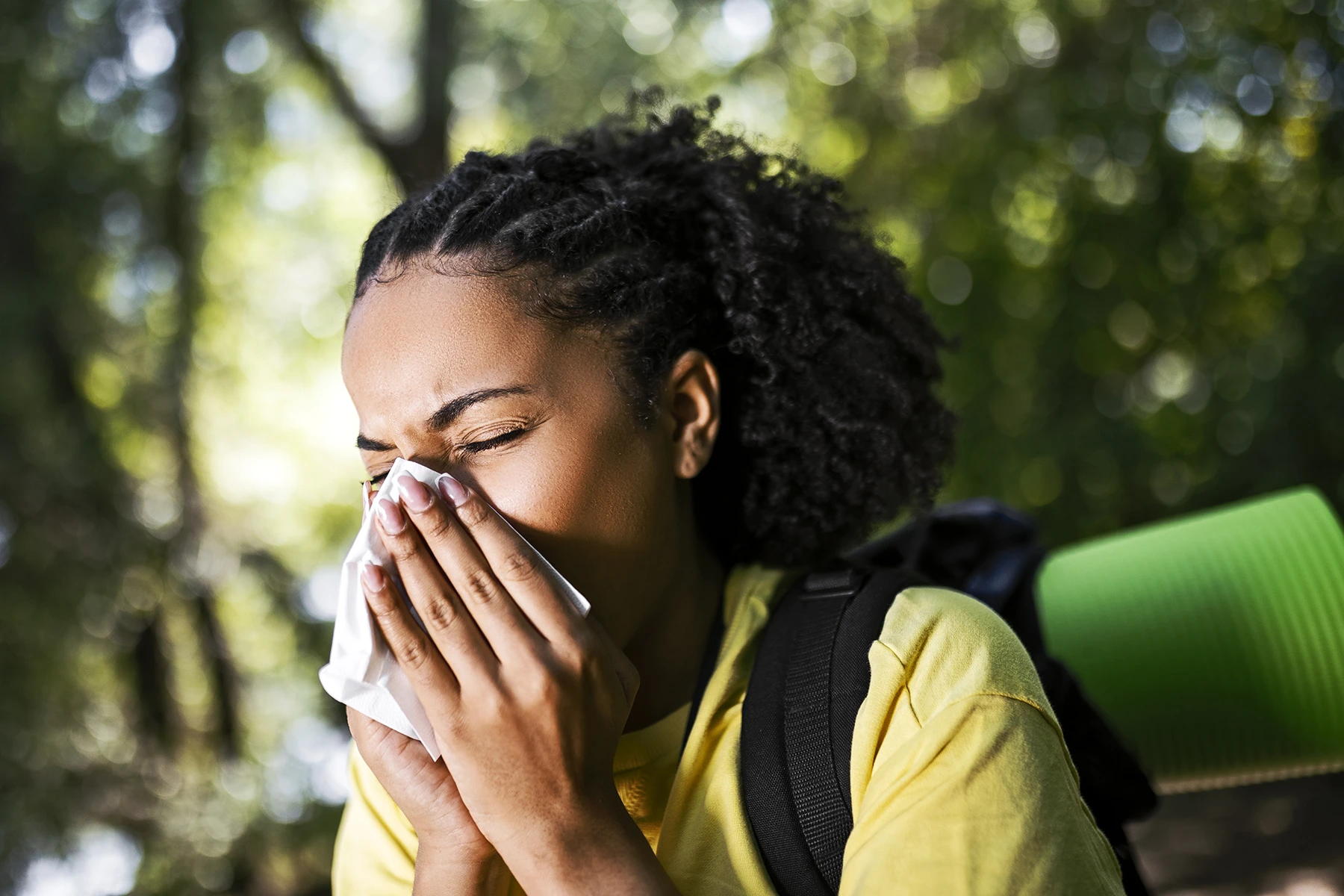How to Cope with Seasonal Sinus Problems

According to the Asthma and Allergy Foundation of America (AAFA), allergy seasons are longer and more intense than ever before.
Research has shown that you can develop allergies for the first time later in life, even in your 30s, 40s, and beyond. So, if symptoms are hitting you harder this allergy season, you may be experiencing adult-onset allergies.
Dominique Bohorquez, M.D., an otolaryngologist with the University of Miami Health System, says it’s worth consulting with an ENT specialist anytime that symptoms are impacting your quality of life.
“You may have allergic rhinitis if you have symptoms of sneezing, runny nose, nasal congestion, itchy eyes and/or itchy throat during specific seasons or all year round. They can also occur around specific triggers like trees, dust, cats or dogs, pollen or mold,” she says. “There is no threshold to seek an ENT for guidance. We are always here to help.”
How to manage your sinus symptoms
The good news? Allergy symptom relief is easier than ever, particularly with all the over-the-counter medications now available. Dr. Bohorquez recommends consulting with a physician first before trying any medicines on your own.
“My personal favorite medications to treat allergic rhinitis are fluticasone, an intranasal steroid spray that reduces nasal inflammation, and azelastine, an intranasal antihistamine or anti-allergy spray,” says Dr. Bohorquez.
“For severe symptoms, I always tell patients to take an anti-allergy pill such as cetirizine. Other anti-allergy pills include loratadine or fexofenadine. Avoid taking any anti-allergy pills with a ‘D’ since they have pseudoephedrine, a decongestant that can cause adverse side effects if taken regularly.”
People can take other steps to manage sinus allergy symptoms, such as using a neti pot or another form of nasal rinse to remove allergens from the nasal passage.
“Nasal saline rinses can help wash away any allergens you’ve been exposed to throughout the day,” says Dr. Bohorquez. “You can do a gentle saline rinse followed by your medicated nasal sprays both morning and night.”
One of the best ways to combat allergy symptoms is to avoid the offending allergens (as much as possible).
- Use caution when pollen is high. The Asthma and Allergy Foundation of America (AAFA) says that pollen counts are typically highest from 5 to 10 a.m. and at dusk. They also tend to spike on warm, breezy days, so those are the best times to stay indoors if you can.
- Protect yourself indoors. You can keep the pollen count down indoors by keeping your windows closed, using high-quality HVAC filters, removing your shoes and changing (and washing) your clothing when you enter your home, says the AAFA. It’s also a good idea to clean pets off with a towel when they come inside.
- Protect yourself outdoors. Minimize your exposure outside by wearing a hat and sunglasses, or even gloves, or a mask and goggles if you’re doing yard work.
- Check the pollen count. You can get this information as part of your local weather report or through pollen count websites.
Have you gotten an allergy test?
If you are still experiencing allergy symptoms, even after taking preventive measures, consider taking an allergy test. The American Academy of Allergy, Asthma & Immunology (AAAAI) says that testing can help provide more specific information about your allergens or the substances to which you are having an allergic reaction. They also make immunotherapy, or allergy shots, a possibility for treating your allergy symptoms.
“My first step would be to have formal allergy testing (skin or blood test) with an allergist,” says Dr. Bohorquez. “Based on your sensitivities and allergens, your allergist can recommend immunotherapy. Immunotherapy is a treatment that gradually introduces small amounts of allergens to the body over time, aiming to reduce the body’s allergic reaction to those allergens.”
If you test positive for a specific allergen during an allergy test, it doesn’t necessarily mean you’re allergic to it, she says. “You must have symptoms such as nasal congestion, runny nose, sneezing, itchy eyes, etc. when exposed to that allergen for it to be considered a true allergy.”
Written by Wyatt Myers, a contributor for UHealth.
Sources
Pollen Seasons Are Longer and More Intense, Affecting Millions, Asthma and Allergy Foundation of America (AAFA), Mar 18, 2025, https://aafa.org/pollen-seasons-are-longer-and-more-intense-affecting-millions/
Do Seasonal Allergies Develop with Age?, Northwestern Medicine, April 2024, https://www.nm.org/healthbeat/healthy-tips/Do-Seasonal-Allergies-Develop-With-Age
Interview with Dominique Bohorquez, M.D., an otolaryngologist with the University of Miami Health System.
Tips for Coping with Spring Allergies, Allergy and Asthma Foundation of America, 2017, https://community.aafa.org/blog/tips-for-coping-with-spring-allergies
Pollen.com, https://www.pollen.com/
All About Allergy Testing, American Academy of Allergy, Asthma & Immunology (AAAAI), 2022, https://www.aaaai.org/tools-for-the-public/conditions-library/allergies/all-about-allergy-testing
Tags: allergy management, Nasal congestion remedies, otolaryngology in Miami, Seasonal allergies
